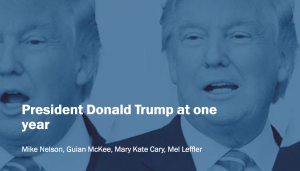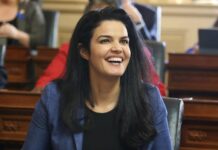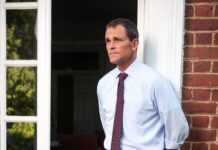
The Miller Center for Public Affairs invited a panel of University scholars and special guests to its campus this Thursday for “President Donald Trump at One Year.” The event enabled policy experts to reflect on the state of the nation since President Donald Trump took office last January.
Panelists included Stefanie Georgakis Abbott, the Center’s Assistant Director of Presidential Studies, University instructors Guian McKee and Melvyn P. Leffler, political scientist Michael Nelson, and former presidential speechwriter Mary Kate Cary.
The speakers were tasked with assessing President Trump’s performance in office from two perspectives: historical and political. McKee characterized the new administration’s first year as a “missed opportunity.”
“In his first year, Trump has further divided — rather than healed — our nation,” he said.
No polarizing subject was off-limits — from the president’s controversial travel ban that one panelist called “ill-advised,” to what Nelson described as Trump’s “mastery” of social media as a means of connecting with his base, to what McKee said was a “shameful” presidential response to the white nationalist events here in Charlottesville last August.
The panel itself was conceived as a culmination of the Miller Center’s First Year: POTUS 2017 Project. According to the Center, this First Year initiative is “a collaborative undertaking with those who know the executive branch” and a collection of policy prescriptions from “current and former senior government officials, think tank scholars, journalists, and leading academics.” The First Year Project’s website explains that its aim is to deliver its ultimate product directly to key Trump cabinet officials, as “a new president can best look forward by first looking back.”
In Michael Nelson’s portion of the symposium, the Miller Center fellow noted that, unlike many past inaugurations, the United States was not at war or in the midst of a recession when President Trump took office.
“Donald Trump was fortunate to take office when he did,” Nelson said. “Although the world had its share of problems…they were ongoing, not new or emerging, and unlike all of his recent Republican predecessors, Donald Trump took office with a Republican Congress. So when you look at it that way, Donald Trump was dealt a very good hand.”
Nelson pointed to Trump’s inexperience with checks on his authority as an explanation for his missteps as Commander-in-Chief, despite the “good hand” that he was dealt.
“Nothing in his long business career had required Donald Trump to share power,” Nelson explained. “The point being, he didn’t come out of that sector of the business world — the publicly traded corporations — where you have to share power with other shareholders…He was the boss…Examples of ignorance abounded [in President Trump’s first year].”
McKee agreed with Nelson, criticizing the president for a lack of “self-knowledge” or “even a basic comprehension of the health care system.”
“Most of the recent praise of Trump’s record comes from social conservatives,” he added. According to McKee, what he described as “conservative policy wonks” with more legislative expertise “tend to be much more muted or even critical.”
Leffler, a professor in the University’s Corcoran Department of History, focused his remarks on Trump’s effect on U.S. relationships abroad.
“America’s standing in the world has plummeted,” Leffler said. “Only 22% of people around the globe believe that the United States today can be relied upon to do the right thing in a crisis.”
Leffler also disparaged the president’s “America First” plan, calling it a “zero-sum game of world politics” opposed by “the vast majority of foreign policy experts,” and a strategy that “actually brought World Wars in the first part of the twentieth century and repeated depression.”
“What made America first was promoting an open world, promoting free trade, lowering tariffs, championing currency stability, supporting multilateral institutions like the United Nations or the World Bank, championing democracy and self-determination and freedom and human rights — although not always living up to those things, nonetheless always championing those things,” Leffler explained.
“What made America great was building alliances with like-minded countries and supporting the principles of collective security,” he continued. “These were the policies that bred peace amongst the great powers for the last 75 years. No great power war. Do you know what an accomplishment that is? That’s what made America great…These were the policies that brought more people out of poverty in the last 40 years than in any comparable era in world history.”
As far as Leffler was concerned, a Trump administration puts today’s America in a precarious position.
“I agree with the scholars who say we should be worried,” he said. “Indeed, we should be very worried.”
To watch “President Trump at One Year,” click here.
For an anthology of essays from the Miller Center’s First Year Project, see Crucible: The President’s First Year, edited by Nelson, Georgakis Abbott, and Jeff Chidester.
















